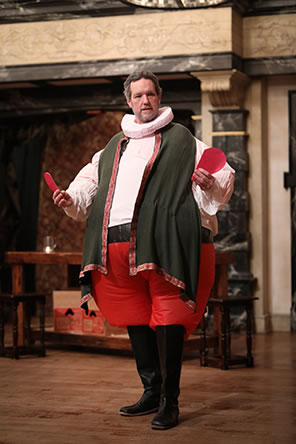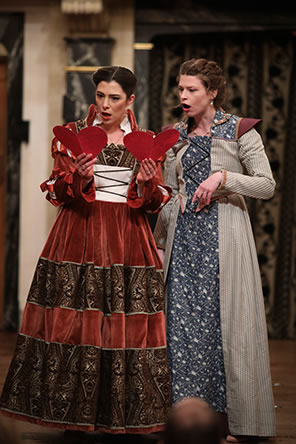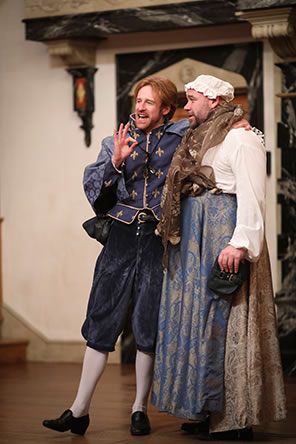The Merry Wives of Windsor
I'm Just Saying
American Shakespeare Center, Blackfriars Playhouse, Staunton, Virginia
Saturday, February 16, 2019, J–11&12 (Back of stalls)
Actors' Renaissance Season


Top, Sir John Falstaff (John Harrell) prepares to send love notes to the wives of Ford and Page in the American Shakespeare Center's production of William Shakespeare's The Merry Wives of WIndsor at the Blackfriars Playhouse. Above, Alice Ford (Abbi Hawk) and Margaret Page (Meg Rodgers) compare notes. Photos by Lindsey Walters, American Shakespeare Center.
Rick Blunt walks onto the Blackfriars Playhouse stage in Staunton, Virginia. That's all he has to do for cheers to erupt from half the patrons in the filled-to-capacity theater. The other half are newcomers to the American Shakespeare Center's re-creation of William Shakespeare's indoor theater, the only such specimen in the world, so they don't know Rick, the only such specimen in this world. The rest of us, who haven't seen him in more than three years, are glad to have him back. Not that we haven't seen great actors in the interim, and not that he was a great actor himself, but he has a big personality and stage presence perfectly suited to Shakespeare-era plays in which characters interact directly with audiences and the lights stay on for everybody in the room during the play.
Yet, something has changed about Blunt since he last performed here: he's upped his game as an actor (he tells me later that teaching acting himself has made him more conscientious about applying the lessons he had learned). We're at the Blackfriars for this year's Actors' Renaissance Season, the annual effort by the American Shakespeare Center (ASC) to replicate the production practices of Shakespeare's company in the staging conditions of Shakespeare's theater. A dozen actors without a director or production team mount a repertory of four plays with only about five days of rehearsals for each play. As is typical of ASC ensembles, but especially those of the "Ren Season," the current company features outstanding actors. Blunt stands out, not just for being Rick Blunt but for his accomplished work in William Shakespeare's The Merry Wives of Windsor and Henry IV, Part One, and in Amy E. Witting's Anne Page Hates Fun (the last is having its world premiere this weekend as the initial production of ASC's Shakespeare's New Contemporaries project). I'm highlighting Blunt in this particular review because what he brings to the roles of Mistress Quickly and the Host of the Garter Inn exemplify the skills of an ensemble that make this Merry Wives of Windsor the creamiest of the crop I've seen.
Blunt, who always used to work the crowds in preshows at the Blackfriars and for the company's touring troupes, is a born midway barker, a convincing salesman, and a gregarious host. "I'm just saying" is his go-to phrase. He has filled the shoes of Shakespeare's most gregarious characters: Bottom, Falstaff, Don Armado, Touchstone, Lucio, and Iago, as well as David Sedaris' Crumpet the Elf. I wrote of his Bottom in A Midsummer Night's Dream, "Rick Blunt was born to play Bottom; and his Bottom was born to play Pyramus." I've long considered Blunt the reincarnation of Will Kemp, who originated Bottom and other Shakespeare clowns in the first half of the playwright's career. Kemp also originated Falstaff, and Blunt's earthy and obscene take on the fat knight might have been as close to Shakespeare's intentions as we may ever get (unless, as the record suggests, Kemp hijacked the part from Shakespeare's intentions).
In the three plays this weekend, Blunt is playing female characters. We couldn't imagine how Blunt would pretend to be a woman, and the fact that he doesn't turns out to be a seismic decision. More and more companies are using cross-gender casting for Shakespeare, and the ASC has been doing that as part of its original-staging-practices methodology since the company's founding 30 years ago. Most cross-gender casting is women in men's roles, but I've seen men playing women, here and elsewhere. Whereas actresses typically don't try to be obviously male in voice, manners, and movement, actors more often try to be obviously female. Some would say this is good acting, and sometimes it is, but usually it's merely vamping and interferes with the character.
Blunt doesn't resort to stereotype tropes—except, I guess, his own Rick Blunt tropes that happen to befit his characters. Mistress Quickly is a gregarious character, yet even in this regard Blunt plays the language rather than the gender. This is particularly effective in Henry IV, Part One, when Falstaff twists Quickly's words into unseemly double entendre. "Go to, you are a woman, go," Falstaff says. "Who, I? no;" replies Quickly. "I defy thee: God's light, I was never called so in mine own house before." Yes, we get the fourth-wall-cracking aspect of this joke if not the sexual innuendo, but in Blunt's abused tone we do get the sexual innuendo while making us empathetic for this woman, both for her consternation and for how she is beguiled. This production of Merry Wives retains the oft-excised scene in which Sir Hugh Evans (Brandon Carter) puts young William Page (KP Powell) through his school lessons with its obtuse Latin-fueled sex jokes. Blunt nails these jokes and plays to the hilt Quickly's reactions to Evans teaching a young boy about Jenny's case and whores.
Let's skip ahead to tonight's Anne Page Hates Fun. In the opening scene, Janice Sanning appears in long black hair, lipstick, and blush on her cheeks. Playing the part is a member of the company I don't recognize—for about 30 seconds. The voice, the delivery, the gregarious nature of the character clue me in that she is Blunt. Though totally passing as a woman, he concentrates his performance on the personality beneath her gender, a nurse who is deeply caring albeit forceful in her manner—a very blunt woman (I'm not the first to use that joke: John Webster gave Blunt a similar line in The Duchess of Malfi). Notably, upon Janice's appearances I hear none of the titters that usually erupt when a man comes on stage dressed as a woman. Blunt's remarkable transformational performance as Janice is authentic character acting.
Back to The Merry Wives of Windsor and Blunt's more difficult role in the play as the "bully" Host. It's a sledgehammer of a part, the overly effusive proprietor of the Garter Inn bellowing hospitality and bonhomie. Naturally, the gregarious Blunt would be cast as the Host and turn the part into a Blunt force, but what he does that matters more is work his lines' rhythms so acutely he mines the vein of comic gold running through the character. "Let them keep their limbs whole and hack our English," he says when he intervenes in the duel between the Welsh Parson Evans and the French Doctor Caius. I've never seen this line get a laugh, but Blunt's demonstrative reading of it—with no comma—lands a big laugh here, something his Host accomplishes throughout the play. I've been inclined to wish productions would drop the part, but Blunt reveals the Host to be another brilliantly written, singularly Shakespearean character.
In this, Blunt is representative of the ensemble. The Merry Wives of Windsor is much-maligned for its simple plot, for its downgrading the character of Falstaff from Shakespeare's iconic creation for the Henry IV plays, and for its silly Herne the Hunter climax. The verse-speaking skills and textual understanding this cast employs in performing The Merry Wives of Windsor establish the play as a comic masterpiece, with a motherlode of great verbal jokes along with great slapstick set pieces. Beyond the "hacked English" of Hugh and Caius, the dialogue for the titular wives, Falstaff, Ford, Justice Shallow, Slender, and the Host, too, is character-driven joke writing as good as what has emerged out of the writers' rooms of Will and Grace, The Big Bang Theory, Friends, The Office, Modern Family, and Parks and Recreation—and Much Ado About Nothing, too. I must point out as well to all maligners that every time I see this play, the audience cracks up when Falstaff shows up for the final scene in deer antlers. Every time. It's one of the few guaranteed laughs in all of theater.
During this performance, I'm hearing jokes I've never heard before, requiring me to check the text afterward (and there they are, written as spoken). Most masterful of all is John Harrell as Falstaff. Wearing an inflatable fat suit that makes the "Two yards, and more" joke about his girth an understatement, Harrell can't engage in much gesturing humor. His physical comedy is pretty much just being there and hurrying off the stage to make his appointed assignations. Harrell thus makes the language carry the character's comic weight by melding his deep understanding of Shakespeare's texts to a lecture-like attitude and cadence for Falstaff, thus portraying the same agile intelligence we see in the Falstaff of the Henry IV plays (though Harrell's approach to the character in the two plays is completely different, as I'll explore in my review of this weekend's Henry IV, Part One, production). Harrell does have one incredible moment of physical humor, when he gets inside the buck basket. It's much too small, so with a bit of slight-of-hand he deflates his body and seems to fold into the tub—I half expect to hear him cry, "I'm melting!"
After Falstaff has been carried in a laundry buck basket and dumped in the Thames at the hands of the mischievous wives pranking him, Mistress Quickly, the wives' go-between with Falstaff, blames the servants who carried the basket. "They mistook their erection," she says. Maybe most productions correct Quickly's malapropism to "direction" thinking it's a First Folio typo, or maybe most Quicklys gloss over the line. I hear it this time because Blunt is playing the context of the moment: Quickly is trying to appease the angry Falstaff, so Blunt's soothing tone contains a hint of seductive lilt that draws out erection. Falstaff in his paced cadence replies, "So did I mine, to build upon a foolish woman's promise," Harrell milking a laugh out of that comma (every comma, semicolon, and colon counts in Shakespeare). Two experts collaborating on five words earn two big laughs where rarely a snicker is heard in other productions of this play.
Such subtle dexterity with the verse is evident across the cast. Special kudos to Carter for his Welsh mangling of English as Hugh Evans, to Calder Shilling for his French mangling of English as Doctor Caius, and to Chris Johnston for his indignantly handling English as Justice Shallow. Benjamin Reed infuses his stand-up-guy characterization of George Page with notes of cynicism, even toward best friend Ford but especially in his attitude toward Fenton (Johnston), who's been courting his daughter Anne Page (Shunté Lofton). Every time Reed's Page addresses Fenton he wants to call him something other than his name and stammers on the initial F for a friggin' long time.
The titular wives, Alice Ford (Abbi Hawk) and Margaret Page (Meg Rodgers), might be wearing Elizabethan costumes, but they are thoroughly modern BFFs. The two actresses have an easy chemistry to match the alacrity with which they work the verse. Upon meeting Mistress Ford in the first scene, Falstaff takes her hand and says, "By your leave, good mistress," and formally bows to kiss her hand. Hawk curtsies and keeps sinking lower and lower so that Falstaff's lips never touch her hand; he can only go so low with her. She similarly seduces Falstaff while smoothly avoiding his touch as she speaks in equivocations that go totally over his head. On Falstaff's first rendezvous with Mistress Ford, while he hides behind the arras, the wives enjoy a picnic with wine as they play-act alarm that the jealous Ford is approaching to seek out Alice's lover. On the second rendezvous, the two wives sip from a champagne bottle through a straw as they pull off the same schtick with Falstaff, again, hiding behind the arras. A measure of the duo's success in these roles: their idea for the Herne the Hunter scenario doesn't seem far-fetched at all.

Dr. Caius (Calder Shilling) talks to Mistress Quickly (Rick Blunt) in The Merry Wives of WIndsor at the Blackfriars Playhouse. Blunt shaved before playing Janice Sanning in Anne Page Hates Fun. Photo by Lindsey Walters, American Shakespeare Center.
The troupe members decide among themselves the setting for these productions, and then each chooses his or her costume. It says a lot about how they see their characters. In this Elizabethan costumed–presentation, many of the tones are muted blacks and grays except the colorful gowns that the wives wear and Fenton's richly brocaded doublet and breeches. Johnston is expressing visually Fenton's playboy background as a companion of the Henry IV plays' Prince Hal (though Fenton is not a character in those plays). When Ford (David Anthony Lewis) disguises himself as Brook to find out if Falstaff really is having an affair with his wife, Lewis accouters himself with an eye patch and red sash around his waist. Carrying a sack of money over his shoulder, he gives the impression of Brook as a pirate or highwayman. I can't recall not seeing Brook played as an uptight wuss, but Lewis's choice to make Brook a scoundrel makes more sense. That's how the jealous Ford would see the man his wife would have an affair with. Brook's language even uses thieving imagery, describing his love for Mistress Ford "Like a fair house built on another man's ground; so that I have lost my edifice by mistaking the place where I erected it." There's that erection pun again.
Here's another revelation. Present during the aborted duel between Evans and Caius is Shallow's cousin Slender (Powell), one of Anne Page's courters and quite the fop. Slender speaks three lines in this scene: "Ah, sweet Anne Page!" when he arrives; "O sweet Anne Page!" midway through the scene; and, "O sweet Anne Page!" right before he leaves. None of these interjections has anything to do with the dialogue in this scene, and Anne Page is not there. The gag has never made sense to me on the page and has never worked on a stage—until now. Powell's Slender is practicing how to greet Anne Page in their upcoming meeting. His first two utterances pass without notice, but he speaks the last in a sexually shocked tone a guy might use if Mrs. Robinson were seducing him. With a look of satisfaction that he's got his greeting down, Powell scores the scene's exit laugh.
Having bestowed all of these kudos for the cast's superior Shakespearean skills, let's close with a bit of unintended stage business. After Fenton's meeting with Anne Page is interrupted, first by Slender and then Anne's parents, he's left alone with Mistress Quickly, who has been watching and coaching him from the side, Blunt standing at the bottom of the steps leading up from the audience to the stage. His dress snags on something and comes off as he makes his way up the steps. He is wearing his Host costume underneath—at one point, Blunt exits as Host and re-enters as Quickly on the very next line—but he works to reattach his dress as he continues the scene. The audience is howling, and Johnston as Fenton doesn't really try to hide his laughing, either, but Blunt bulls his way through the dialogue, and the two manage to work out between them Fenton's putting money in Quickly's purse while she keeps her dress about her. As Fenton exits, leaving Quickly alone to finish the scene with a short soliloquy, Johnston pauses at the door and looks back admiringly at Blunt.
Don't we all.
Eric Minton
February 23, 2019
Comment: e-mail editorial@shakespeareances.com.
Start a discussion in the Bardroom



 Find additional Shakespeareances
Find additional Shakespeareances